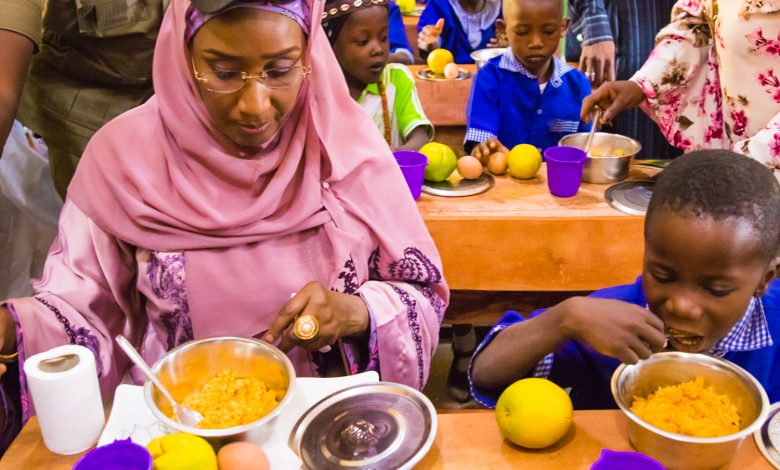The Mystery of Home Grown School Feeding by Nigeria Government

By Kingsley Umoh.
As the federal government of Nigeria continues to grapple with the COVID-19 pandemic ravaging global economy and presenting a new order in human activities, businesses are struggling to survive, there is the possibility of massive job loss, even those who will manage to keep their job, would likely suffer salary cut.
Nigeria is an- oil rich country earning billions of dollars from oil exports per year, but about 70 percent of its estimated 220million population still live in abject poverty, and with the current realities of the corona virus pandemic, government are forced to shut down the economy as international oil price hit an all time low.
The National Assembly had passed N10.59 trillion for the 2020 budget; however, the federal government had recently cut down the budget by N320billion and proposed a new budget of N10.27trillion which on its surface does not look feasible for execution.
But just like they say, government business must go on, and one business the government is insisting on executing is the School Feeding programme which seems to have been coined to the Home Grown School Feeding Programme (HGSFP) for primary school pupils despite that schools are closed and pupils are at home as part of measures to curb the spread of the coronavirus pandemic ravaging the world.
The federal government issued out a presidential directive that the programme should resume on Thursday, May 14, 2020, the programme will begin in Abuja and subsequently in Lagos, Ogun and other states targeting 3,131,971 households for the intervention.
According to Hajiya Umar Farouk, Minister of Humanitarian Affairs, Disaster and Management and Social Development.
“This is a global accepted means of supporting children to continue to have access to nutrient rich foods despite disruptions to the traditional channels of school feeding by the pandemic
The provision of take- home nations will , therefore be carried out based on data provided and structures put in place by the feeding programme over the years”
A member of the House of Representatives representing Degema/Bonny constituency, Farah Dagogo kicked against plans by the Federal Government to feed school children from their home through the National Home Grown School Feeding Programme (NHGSFP), in a statement by his media aid, Farah said;
“The plan to run a feeding scheme for school children at a time when schools are shut nationwide and the pupils are at home with their parents and guardian is questionable.
The appropriate thing is for the government to keep the school feeding programme on hold since schools are currently shut nationwide due to the COVID-19 pandemic.”
The government had announced that the beneficiaries are to received uncooked food items worth N4, 200, before the closure of schools, a total of 9.7m pupils in 53.715 schools received N7O per meal daily in 31 states which amounts to N679 million daily
Meanwhile, former Nigeria Ambassador to Israel, Cyprus and the United States, Prof. George Obiozor laments on this decision by government.
“The idea by the federal government to embark on home feeding of school children during this lockdown was laughable and at the same time wasteful”
A renowned lawyer and Human Right Activist, Femi Falana was enraged and disappointed with government actions.
“The federal government should stop insulting the intelligence of the Nigeria people. For goodness sake, are the school children being fed in their homes by the Minister of Humanitarian Affairs? The statement by credited highly- placed public officers during this crisis has compelled the Nigerian people to demand accountability in the school feeding.”
Former president, Olusegun Obasanjo had launched a similar programme in September 26, 2005, the programmed tagged home- grown school feeding was aimed at improving the nutritional intake by at least 25million children of school age in Africa’s most populous country, the erstwhile president said the programme could not only increase school enrollment and completion rates particularly of children in rural communities and poor urban neighborhoods, but also stimulate local food production and boost the income of farmers.
The present government seems to have lost the trust of the populace, as their antecedent on policies and programmes have not impact positively on the people, in a country with no data base and statistics, the critics of these government have always doubt their sincerity of purpose, and the home feeding programme is no different.
At a time last this, the juries are wondering why the government is going ahead with this programme, when it has no human face in the first instance, will this new arrangement increase or decrease the initial budget for this programme? does the government have the addresses of the school children? How will accountability be made clean in the eyes of the public? What is the guarantee that the food items will get to the beneficiaries? Many questions begging for answers, and the government should provide not just the answers, but should do it with enormous conviction if they are to win back the heart of the Nigerian people.






